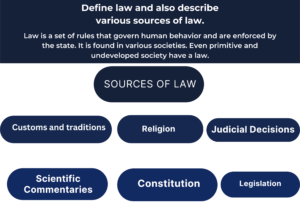Define law and also describe various sources of law.

Law is a set of rules that govern human behavior and are enforced by the state. It is found in various societies. Even primitive and undeveloped society have a law. Through various institutions, the State exercises the control over the society. Normally the true law includes all rules and regulations, directions and orders of established authority. It is not possible to violate those law who violate them are liable to face consequences.
Maclver and Pages
have defined law in the following words-
“Law is body of the rules which are recognized, interpreted and applied to a particular situations by the courts of State. It drives from various sources including customs but it becomes law without the State, which means, the courts are prepared to enforce them. Law is a rule binding on the citizens and residents within its jurisdiction. “
Here we will define law and describe the various sources of law
Sources of Law –
Sources of law means origin of law from which the develops. There are various from which we derive law. The most common sources of law are as follows-
(1) Customs and traditions –
Every society has certain customs and traditions which regulate the behaviour and life of the members of the society. On the basis of these customs and traditions, the State frames the laws. That is why MacIver has said that the most of the laws codified by the State are not its gift. They are already present in the society and the State only deletes some and codifies others.
(2) Religion –
Religion is another source that guides and regulates the behaviour of the individuals. It is recognised not only by the society but also by the state. On the basis of the religion; the State frames and enacts laws. Typical example of the religion acting as a strong source of law is ‘Muslim Personal Law,
(3) Judicial Decisions –
In most of the countries, judicial decisions are authoritative and develop into sources of law and know as ‘case law’. These decisions are helpful in solving the problem of future. Many of the decisions of higher court such as High Court and Supreme Court etc. become law not only for lower court but also for other members of the society. Sometimes the Government and other agencies enact and frame laws on the basis of these decisions.
(4) Scientific Commentaries –
Jurists and other scholars write certain commentaries on certain laws. In these commentaries they bring out the facts inherent in the law to light. In the beginning, lawyers and other persons interested in law use them for their own purposes, but later on, courts accept these and they become law. The scientific commentaries relate to certain principles serve as an important source of law.
(5) Constitution –
A set of fundamental ground rules in a country’s Constitution sets out the powers of the different branches of government. The Constitution may also set out basic principles, such as fundamental freedoms and rights. In Civil Law systems these rules are usually embodied in “Codes”.
A Constitution overrides any other source of law and it is usually highly difficult to amend. There may be a separate judicial court which considers constitutional issues.
(6) Legislation –
Legislation is one of the source of law and usually takes priority over sources of law other than the Constitution.
In the modern society legislation is the most important source of law. In democratic societies, it represents the will of the people. Legislators, who are the representatives of the people, enact various types of legislation to meet the needs of society, and society recognizes these legislations as law.


